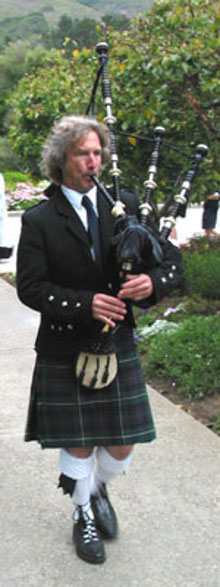

Monterey County Weekly Article
Weekend in the Highlands
The 40th Annual Monterey Scottish Games and Celtic Festical Wraps Toro Park in Plaid
by Maureen Davidson, Monterey County Weekly
When Michel d'Avenas, a serious local piper who had studied with the best in Scotland, returned to the region after serving in Vietnam, the two and others developed a competition band. Over the years and several permutations, this became the Monterey Bay Pipe Band.
For a decade the band has consistently won first-place awards at highland games in the US and Canada. It led the Caber Parade on Sunday and marched in Monterey's Fourth of July parade, and this weekend will compete with pipe bands from all over the US and Canada at the Scottish Games.
Three years ago, Pipe Major d'Avenas founded the Monterey Bay School of Piping and Drumming in his ongoing effort to elevate US piping. He then convinced the National Piping Center of Scotland to take it over. Over the past week, the acknowledged world masters of bagpipes and Scottish drums have been here to teach at the school.
Since Sunday, 40 musicians from all over the US have been working at the Robert Lewis Stevenson School in Pebble Beach to learn from the National Piping Center's director, Roddy MacLeod (recipient of an MBE-Order of the British Empire, a chivalric honor presented by the Queen); Lorne Cousin, who played with Madonna's band on the Worldwide Re-Invention tour; and six other renowned piping, drumming and drum majoring musician-instructors sent from the Piping Center in Glasgow.
"No matter what you play on the pipes," Michel d'Avenas says, "it sounds sad." He is talking about the mixolydian tuning of the bagpipes, a flattening of the seventh note in a major scale. It's a lot like bending notes in the blues. It must be what makes the bagpipes so heart-rending while playing a dirge like "Flowers of the Forest" (about the youth of Scotland dead at Culloden) or "Amazing Grace," often played on the pipes at funerals.
In a Pebble Beach room filled with light and books and bagpipes and chanters and drums and reeds and a very large table, d'Avenas equips me with an instrument made of spotted red and African black woods—a chanter—the recorder-like melodic part of the bagpipe, with a reed made of Spanish cane, a form of bamboo.
A bagpipe is a complicated instrument—the chanter for melody, a bag that is pressed to emit air, and several pipes that are drones tuned to different notes. Blowing air from the bag through the pipes, modulated by the chanter, augmented by the drones, it's a continuous flow of sound with no rests, no stops, requiring a piper to develop some form of flourishes to signal a change of bar or key.
"People who get into bagpipes tend to be on the eccentric side," d'Avenas says. "And of course part of what attracted me to the bagpipes is that so many eccentric people practice it." He's been playing for 35 years—beginning at a time when American pipers and pipe bands were mere caricatures.
In my own second year in the US, attending a Miss Universe Parade in Long Beach, I remember hearing a pipe band approaching from a distance, causing my little Glaswegian head to turn with smiling expectation, but, at the sight of a half-hundred men—and women, gasp—in kilts worn way too long and not hung right, and the pipes just a shrill mess, and wimpy drumming, I actually felt sick. But now, Americans who have taken up piping have become more serious about the art, and over the last 10 years, after San Francisco's Prince Charles Band broke through to the top ranks of pipe bands in the world, there has been a significant paradigm shift.
"And there have been a lot of improvements that help keep the pipes in tune," d'Avenas says.
"I listen to a recording of a prominent Scottish band of 40 years ago. I can hardly bear it. Now I personally adjust the tuning in all the chanters in the band." He shows me a chanter with electrical tape cutting off millimeters of a few of its holes.
Bagpipes are sensitive. "A lot of moisture in the air and the pitch just goes up. It can be shrill if you don't adjust it. If it's hot and dry, some pipers use a little ice water in the bag of the pipe."
With all of its eccentricities, why would anyone choose such an instrument? "People like it because there's so much going on, the melody, the drones, etcetera... Kids like it because it's so stinking loud."
All contents ©2007 MONTEREY COUNTY WEEKLY and may not be republished without written permission